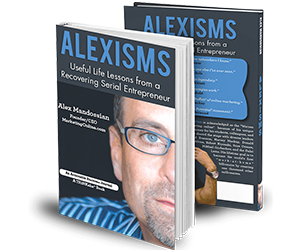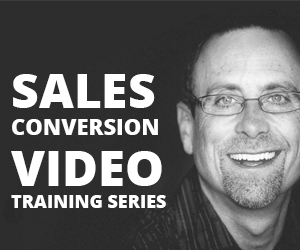Do You Make These Mistakes In Seeding Your Sales?

Seeding is an incredibly useful tool and the ONLY way I ‘sell’ to my prospects and candidates. If you’re in the habit of ‘selling’ this may seem jarring to you.
I only SEED, I NEVER sell.
When you seed you begin a dialogue that will bear fruit over time.
When you seed you give yourself time to assess your customer’s certainty.
When you seed you learn a person’s objections and answer their concerns.
When you sell, you do none of those. Selling gives you a short window of time in which to talk at your customer, explain your product, tell them about you and ask if they’re interested.
Some marketers think there is a place for selling and a place for seeding.
I disagree.
I think ‘selling’ as a marketing paradigm is dead. Seeding is the new paradigm. Seeding is a model of getting interested in and knowing your customer while developing and lifelong relationship.
The last two posts focused on how to seed and several ways you can use seeding to maximize your results.
Related Post: Take the Guesswork Out of Seeding Your Sales
Related Post: This is How You Sell Anything
Related Post: The Secret to Eliminating Rejection in 3 Easy Steps
This post is about the mistakes that are easy to make when you’re learning to seed so you can avoid them.
In short, Seeding is really just starting a conversation with someone or a group of someones.
You’re asking pointed questions about the possibilities and gauging the person’s receptivity based on their responses.
Seeding prompts the person to see themselves using your product or service with success.
And it does take talent to do that but it’s a talent you can learn to do with ease.
Why?
Isn’t it more relaxing to have a conversation than going in trying to sell someone something? When you go in like that you’re going in with a lot of expectations about the results. And if you don’t get the results you expected you feel defeated.
When you go in simply wanting to talk with someone, ask questions, get to know them and what they need, however that conversation ends is the success.
Say that conversation ends without ‘getting the sale’. But in that conversation you end up finding out why you didn’t get the sale. The product may not be what they want or need. It may not be the right time.
That outcome is not a dead end or a failure. You know why?
You started a relationship.
And many times it’s more lucrative to start a relationship than to make a quick sale.
Seeding = playing the long game.
Selling = short term profits.
So to increase your ease stepping into this new talent here is a list of mistakes to avoid when you’re first getting the hang of seeding.

Mistake: Not Asking Enough Questions
Seeing your prospect as a person may be daunting at first. You have to really take a moment to put yourself in the right frame of mind and tell yourself that meeting with this new prospect is about starting a conversation, not selling anything.
It may take a few at-bats to reframe each dialogue. But it’s worth it. When you come in ready to sell the person can smell it. When you drop that intention and simply become interested in the prospect, well, they can smell that too.
And they’re much more receptive to the latter.
But, what keeps a conversation going?
Questions.
The first few times you try to reframe you may end up walking away after some introductions and a short back and forth. You may think to yourself, “where do I go from here?” “Omg, there’s an awkward pause now. What do I say?”
Ask. Ask. Ask.
If you find yourself in an awkward silence, start asking questions. Get interested in the other person. If you want to do this right memorize a few seeding questions before you begin any dialogue.
Questions like:
“Can you see the possibilities of this program?”
“If you mastered these skills, where could you be three years from now?”
“Do you see the simplicity of this process?”
A Quick Note Here: I speak mainly to coaches, trainers and public speakers. These people are, by definition, in it for the long game. They typically work with a client for a minimum of 3 months.
However, seeding is an art and strategy for any kind of sale and any kind of product. You simply need to taper your discussion, your dialogue and your questions to your product or service.
The questions I just showed you here are easy to memorize and have the advantage of keeping a conversation going.
So when you’re stuck remember to seed the conversation with a question. Better yet, don’t get stuck. Memorize those questions and keep them on hand so your dialogue is just as meaningful to your prospect as it is to you.
Mistake: Not Having A 60/40 Dialogue
I think there is an ideal ratio of presenter to prospect dialogue. You certainly don’t want your prospect to dominate the conversation and bulldoze their way out of the room.
But you don’t want to just monologue at them and hope they absorb everything you said. That’s not seeding. That’s selling.
Selling is spewing all your knowledge about the product and why you think your prospect needs it and then asking for their credit card info. That tactic just isn’t viable in today’s over-saturated marketplace.
I have a 60/40 rule of thumb when I’m talking to a client or candidate (I call them candidates rather than prospects).
I speak 60% of the time. That includes describing my service, asking questions, seeding and answering my candidates questions.
Then I like to make sure my candidate speaks about 40% of the time. They ask questions of their own, raise their objections, and answer my questions about them.
Giving your client 40% of the dialogue to talk about themselves is invaluable. It gives you a trove of information you can dial into your market research. But it also allows the candidate to talk about their favorite subject…themselves.
Even if you ‘don’t get the sale’ your prospect will walk away with a wonderful impression of you and a memorable conversation.
You get to keep the info they provided. 😉
So stop monologuing and start dialoging. Find your own ratio if 60/40 doesn’t work for you. But that ratio will be a good baseline to start.
How to Make Even More Money Giving Your Book Away For Free … (Compared To Selling It On Amazon)
Mistake: ’Selling’ too Soon
If you’re going to go to the effort of introducing yourself and your product, and then learning about your prospect’s concerns, objections, desires and goals, don’t ruin the conversation.
Here’s the beauty of seeding: you NEVER have to say things like, “which credit card would you like to use?” or “I’m not gonna take ‘no’ for an answer.”
The sale will come as a natural extension of answering all of their questions and objections.
How do I know?
I do this all the time. This is the only way I ‘sell’ anything nowadays. I present the product or service, I start a dialogue, I ask them questions, I find out their objections, I address those. And then they typically say something like, “ok, I think I’m ready to do this.” or “I’d like to give this a shot.” or “Let’s do this!”
You may yield different responses. The point is –
- when you’ve presented the right information for them to make a decision
- when you’ve instilled in them certainty about you and your product
- when you’ve seeded properly
- when you’ve allowed them to ask questions and raise objections
then the sale is more often than not, made.
Here’s the key point: if you’re talking to your ideal customer this strategy almost always yields a sale because you’re meeting a need that already exists.
You know it exists because presumably you’ve done your research to find your target market.
Say you’ve talked about the product, you’ve seeded, you’ve even allowed them to ask questions and have a dialogue. If they don’t have certainty yet about you, your product and your team, but you still try to ‘sell’ them, you won’t have that sale.
You’ve try to sell them too soon.
You need to make sure all those elements are in place before you pop the question. And to be honest, I never ask a ‘selling’ question anymore. I don’t need to. If you do, you’re selling too soon.
Mistake: Not Discovering Your Prospect’s Objections
That leads me to the last two mistakes entrepreneurs make when they’re seeding.
If you don’t include uncovering a prospect’s objections in your dialogue and questioning, you’re going to lose.
People always have objections. Why? Because if you present an option for someone they need time to decide.
Decide means to cut off.
They have to cut off all the other options they may have been thinking about and focus on your offer. That may be a tall order or it may be an easy call. But you won’t know unless you ask.
Starting a dialogue gives the person time to cut off all their other options. And asking them what their objections may be will actually speed the process.
Instead of those objections looming silently in the back of their mind, the issue is brought to the foreground and discussed.
You’re bringing sunlight to the dark places which speeds up their ability to make a decision about you and your product.
Mistake: Not Assessing Certainty About You, Your Product and Your Team
It’s fine to have a Money Back Guarantee. It’s imperative. But that doesn’t mean you want people to use it.
If people are using your MBG too frequently you either have a bad product, or more likely, you ‘sold’ them before they were certain.
People have to be certain about 3 areas before they can be confident enough to buy:
- You
- Your product
- Your team (customer service)
If even one of these areas is not a certainty they will most likely walk away.
They need to feel confident about your product, of course. But even if they like the product and you come off as not trustworthy, they will walk away.
If they like you and the product but haven’t heard enough about the platform they’ll be using or have heard ‘not great’ things about your customer service… You’re done.
Part of your job in seeding and dialoguing is instilling your prospect with certainty about all 3 areas of concern. If they are your ideal customer and are certain about all 3, what is their objection?
They have none.

Related Post: Take the Guesswork Out of Seeding Your Sales
Related Post: This is How You Sell Anything
Related Post: The Secret to Eliminating Rejection in 3 Easy Steps
The Wrap Up
You deserve to live your best life.
That may be sounding like an overused clichè these days, but don’t you?
You deserve sales.
You deserve to have a business that thrives.
You deserve to have customers and clients that use, love and rave about your products and services.
And the way you get there is through seeding. The way you get customers to fall in love with you and your business is to…allow them the time and space needed to do that.
Just like in any relationship intimacy needs to grow between you and your customer. And seeding is how you start to grow that intimacy. And intimacy builds lifelong relationships.
So guess what? I wrote a book. This book is about supporting the entrepreneur.
Entrepreneurship is a noble and heroic and humbling undertaking. I wrote Alexisms as a way to support, inspire and coach ‘from afar’.
As an entrepreneur with over 25+ years of experience I’ve gained a lot of wisdom, mostly through all the mistakes I’ve made along the way.
How incredible would it be to have that wisdom and then write your own book with an easy template and get to bestseller status?
Ok so, you can! Click here to get this easy-to-use template and get inspired, supported and coached for your best life and find out how to write your own book for greater visibility and reach.
Are you using Seeding in your business?
How’s it going?













